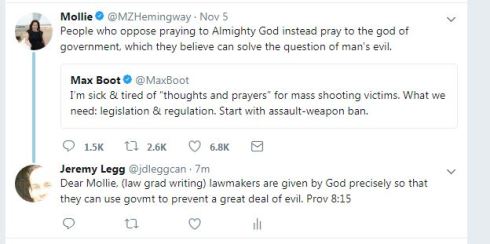Another week, another tragic and unnecessary mass shooting in America…
This time it was the death of some 26 worshippers and the injury of at least 20 others in a church in the small town of Sutherland Springs, Texas that made grim headlines across the world. Many of the dead and injured were young children.
While the tiny First Baptist Church of Sutherland Springs grieves the slaughter of the majority of its congregation and tries to come to terms with such unimaginable carnage, it is the reaction of some church people that grieves me.
I imagine that this reaction is also incomprehensible to a great many other people, both in the US and across the world.
The image below shows one series of quotes from Twitter, beginning with the one in the middle, and including my response:

Typical conservative Christian reaction to mass shootings? I fear so.
Max Boot makes an undeniable point here. Sometimes our thoughts and prayers are not enough. God demands action! Biblical author James certainly thinks so:
“Suppose a brother or sister is without clothes and daily food. If one of you says to him, “Go, I wish you well; keep warm and well fed,” but does nothing about his physical needs, what good is it? In the same way, faith by itself, if it is not accompanied by action, is dead.” (James 2:15-17)
James is crystal clear: sometimes praying and sending our neighbours positive vibes is not enough – no matter how powerful or sovereign the God to Whom we pray.
God demands that we act to prevent suffering and injustice.
For all of you contextualists out there: Does this apply only to Christian brothers (and sisters) who are lacking clothes and food?
Of course not. James immediately widens the scope by laying down the general principle that faith must be accompanied by actions. This could apply to a whole lot of issues.
Is Max Boot wrong to ridicule prayer and faith? Yes, if he is ridiculing all prayer and all faith. But since he is calling people to action, I’d say he’s right in line with James. Is Max Boot a Christian? For the purposes of this discussion, it doesn’t matter. God often uses people outside of His redeemed community to call His chosen people to truth and obedience. Truth is truth, no matter who speaks it, and even if they are wrong about other issues.
Meanwhile “faith” and “prayer”, if they consist merely of good intentions and no substantial actions, do not please God.
What does Mollie Hemingway bring to the debate? She sums up the attitude of many conservative Christians towards gun control: mass shootings are not an issue of too many weapons being too easily available to too many of the wrong people. Rather, it is simply because there is evil in this world that such atrocities occur, and the only thing to do to combat these terrible slaughters is to pray.
In other words: some people are bad. They can’t be prevented from doing bad things by legislation or any form of action. Only prayer can stop them. Indeed, it is wrong – and not only wrong, but heretical, ungodly and idolatrous – to employ any other form of prevention.
I wonder if James agrees with her. I certainly don’t.
Mollie and others, with all due respect, your argument stinks.
It is naive, handwringingly passive, politically impotent, and theologically illiterate, and here’s why:
We are not called to pray and then do nothing.
We are also not called to pray and then helplessly sympathise with the victims as if their plight was unavoidable, like being struck by lightning or drowned in a flood.
Somebody, somewhere, has to act. Somebody has to be the person who leads the way in restoring wisdom and justice to society in order to prevent these massacres. Somebody – or some group of people – has to employ the principles of taking reasonable steps in the name of harm reduction in order that there will be fewer mass shootings, and fewer casualties as a result of such events, in the future.
Yes, prayer is powerful. But if the answer to our prayers lies in human obedience, and we humans don’t obey, where does that leave our prayers?
Why does this attitude exist? Quite simply:
American conservative Christians – or many of them – idolise guns.
They – particularly the less-educated – have made idols of their guns. Those with more learning idolise the notion that private gun ownership keeps Government from perpetrating injustice against the common folk.
Never mind the fact that millions of abortions take place every year under their noses, divorce and fatherlessness are rampant, gay marriage was legalised without passing through Congress, and men are now encouraged to use women’s restrooms if they feel somewhat effeminate, leaving women and girls no recourse if they feel intimidated.
Clearly American conservatives are stockpiling their bullets for something really big.
While they idolise the illusion of safety and self-defence that privately-owned firearms bring, very real dangers stalk their schools, their cinemas, their concerts, and now their churches. These dangers are caused by the largely unfettered proliferation of the very weapons to which Americans look to save them.
Politics, wisdom and the law
Besides the fact that the roots of gun culture are deeply enmeshed in the church, where does Hemingway’s line of thought leave politics and the law? I haven’t read much of her writing, but she appears to be a conservative Christian – the type who usually have considerable respect for moral law.
She is not alone, nor am I trying to single her out. Many writers whom I otherwise admire take the same line as her when it comes to gun control. I quote Hemingway only because her tweet was the first relevant one on the topic that popped into my Twitter feed. Numerous influential Christians, whether in pastoral and teaching ministry, prophetic ministry, or the media, agree with this idea that prayer against “evil” is the only key to overcoming mass shootings.
Don’t misunderstand me – I think prayer is hugely important. I believe in praying to remove the scourge of crime and violence from society, and this includes gun crime and gun violence. I pray for God’s kingdom to come so that the hearts of men and women are changed and redeemed from all kinds of evil. I would expect, too, that the prayers of righteous men and women would avail much in this regard.
Nevertheless, I do not see prayer as a means of abdicating our responsibilities in other areas.
Conservative Christians who argue against gun control appear to be blinkered to their own attitudes to legislation. Christian leaders who call for laws to restrict abortion, criminalise drug use and possession, and curb pornography and prostitution – it’s the will of God, doncha’ know? – suddenly become deeply agnostic when it is put to them that legislation might have a role to play in stemming the flow of blood from mass shootings.
This overlooks the clear evidence of the Bible itself. The Old Testament is replete with laws governing every area of life, including crime (“Thou shalt not steal” – Exodus 20:15) and laws requiring people to consider one another’s safety:
“When you build a new house, make a parapet around your roof so that you may not bring the guilt of bloodshed on your house if someone falls from the roof.” (Deuteronomy 22:8)
If a homeowner is required to make it more difficult for someone to suffer a fatal accident by building a fence around his roof, why should he not be required to take the same kind of steps to ensure that people cannot be hurt by his guns – or that the criminally insane cannot buy weapons that are designed to kill a maximum of people in a minimum of time?
Of course, many conservatives also oppose regulation of the building industry as a clog on capitalism and the free market, so maybe they are immune to this line of argument. But I do wonder how they will answer to Jesus on the final day for having put profits – and indeed their guns – above the lives and welfare of people.
The role of legislation
I studied law – including criminal law and criminology – for four years and in two European countries. I didn’t study it very well, but I did learn a few things.
One thing that stands out is the capacity of law to shape culture and to bring effective change to society. Sometimes that change is destructive. Roe v. Wade unleashed the slaughter of millions of unborn children, creating and affirming an abortion culture that was exported all over the world. The boundaries of abortion law are still being pushed back in many countries, even as abortion clinics are being closed in the US.
Sometimes the effect is positive. Drink-driving legislation has made driving under the influence of alcohol taboo in many societies, and has saved countless lives. The same applies to seat-belt legislation – we now see it as normal to wear a seat-belt while driving and this too has prevented a great many deaths and injuries.
Is that a “godly” outcome? Sure sounds like it to me!
For some reason, Christian conservatives do not see this logic as applicable to gun control. Attempting to impose any kind of limit on the availability of assault weapons is “praying to the god of Goverment”.
I have news for Christian conservatives: God is present in good government.
Indeed, God requires it.
The abundance of laws in the Old Testament, as pointed out above, testifies to this. It is expressly stated in the Bible that good law is from God:
“I, wisdom, dwell together with prudence; I possess knowledge and discretion. By me kings reign and rulers make laws that are just.” (Proverbs 8:12,15)
Of course, Christians who oppose any form of gun control might go on to assert that any form of gun control is an example of laws that are not just. But clearly Government is not per se a false god or the exclusive preserve of Satan.
Again, we don’t hear Christians calling for the repeal of other types of legislation so that we might defeat the god of Government and leave the problem of evil to the God of prayer.
We don’t hear Christians calling for alcohol to be available to minors and prayer vigils to be held instead for them to maintain their sobriety.
For that matter, most Christians would argue that it is wrong to put a glass of whisky and an open bottle in front of an alcoholic, because we would not want our weaker brother to be led into temptation.
By the same token, no responsible church leader would leave pornographic magazines lying around on tables at the church youth retreat and simply pray that the young people would not find the naked images enticing.
Prayer doesn’t absolve us of the responsibility to take reasonable steps to protect others from obvious sources of harm.
So why put guns in the hands of a generation which finds mass murder tempting?
And why resist introducing legislation that might have prevented many of our recent shootings?
It is true that many godless people in politics believe that only politics can solve mankind’s problems. It is also true that many godless people believe that having more money can drive away their woes and give them more of a sense of meaning in life.
No Christian argues against having money – we recognise that we need to earn money to provide for our families and pay our way in life. What we are against is the love of money – putting our faith in money to save us.
The same is true of politics. Yes, godless people may be excessively dependent on politics in the same way that many are excessively dependent on wealth. The wise Christian recognises the good in these things without making them the ultimate authority.
The truth is that conservative Christians simply don’t want to give up their guns. It matters not to them how many children die, or how many people are injured, or how many families have to grieve the loss of a child or a parent.
They say it matters – but it doesn’t matter enough to them to make changes that would save lives.
Too many of them – I have had discussions with some – are too in love with their hunting and rifles to contemplate any restriction on any form of firearm. In contrast, I have friends and relatives here in the UK who hunt with rifles and shotguns. All of them think that the situation in the US is insane. I too have been trained in the use of firearms. It is not as if we are all scared of guns here. We simply deplore the death toll in the US and the intransigence displayed by those who oppose quite reasonable forms of gun control.
America’s conservative Christians apparently stockpile guns and ammunition against the day they are confronted with an imaginary foe – a possibly-maybe foe – while ignoring the very real foes rampaging in their midst.
They urge us not to bow to the god of government – while ignoring God-given wisdom about good governance.
They resist enacting desperately-needed legislation as if it were some kind of capitulation, while failing to see that good lawmaking is given to us by God to protect the weak.
They argue that “criminals will always find a way to commit their crimes” and “murderers will always find a means to kill people”, without recognising that the availability of a firearm constitutes a source of temptation, without which many such incidents might never occur.
Could it be that while we wait for God to answer our prayers to put a stop to mass shootings, God is waiting for us to rend our hearts and start changing our attitudes and behaviour?
While Christian gun lovers utter hollow words, the bodies of men, women and children lie bloodied on hallowed ground. And this will continue to be the case, while God’s people fail to act.
The author graduated in Law and French from the University of Bristol, England in 1997, and has also served on the ministry staff of a local church.



